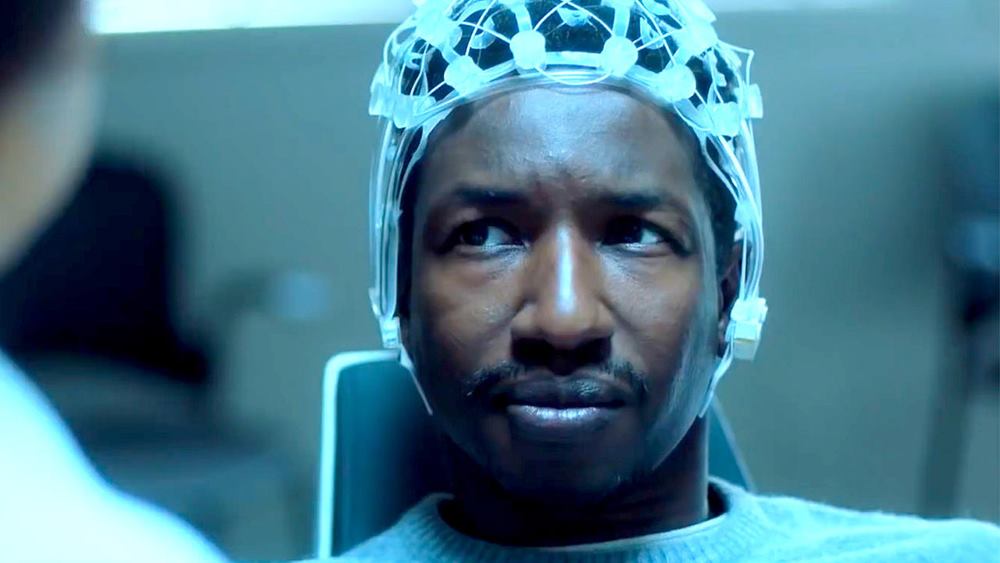What to Watch Verdict
'Black Block' blends a miraculous recovery with an ethical nightmare, but relies on reductive backend storytelling that distances itself from the film's more compelling father-daughter dynamic.
Pros
- +
⌚ Mamoudou Athie confliction.
- +
⌚ Amanda Christine the star.
Cons
- -
⌚ Loses steam during the climax.
- -
⌚ Undersold horrors.
Although Welcome To The Blumhouse is presented as an anthology sampler of Blumhouse’s horror ambitions, we already assumed they’d be standalone segments. The only thing connecting The Lie and Black Box, hitting Amazon as the series’ inaugural offerings, is a family-destructive focus. The latter, Emmanuel Osei-Kuffour’s Black Box, fares better with its sci-fi transplantation themes where the wonders of medicine become an innocent party’s terrifying subconscious prison. Ideologies of medical malpractice under the guise of technological advancement stoke the fires of intrigue, but Black Box is never as compelling as the on-screen events should read.
Mamoudou Athie stars as Nolan, a recovering amnesiac who lost both his memory and wife in an accident. Dearest, darling little Ava (Amanda Christine) should be living an average child’s life, but instead, the knee-high pipsqueak must act as her father Nolan’s caretaker. Whether it’s testing Nolan’s cognitive regrowth, selecting dinner recipes, or assuming adult activities Nolan cannot handle, Ava is in charge. That’s until Nolan meeds Dr. Lillian Brooks (Phylicia Rashad), who claims she can repopulate Nolan’s mind with everything that’s missing through virtual brainwave experimentation. The single father agrees to Dr. Brooks’ treatment plan with Ava's best interests as his inspiration. Unfortunately, there’s something sinister hiding with Nolan’s memories that Dr. Brooks unleashes. A dangerous side-effect birthed from Nolan’s trauma.
If we were to analyze recurring artistic themes as society continues to ever-evolve, 2020 has spiked bodily takeover narratives where we’re no longer in control of ourselves. Come True through the science of sleep studies, Possessor through cranial implant controls, and now Black Box through memory navigation, all within a couple of weeks. Osei-Kuffour’s representation of alternate reality horror is far more straightforward than either of the other mentioned titles, enlisting Troy “Twisty” James as a contorted human figure that slowly creeps towards Nolan whenever he begins to remember another event. Maybe it’s an onlooker at his wedding who inverted crabwalks up the aisle or a jumble of elasticity limbs that emerges from a baby crib in Nolan’s old apartment. Painful bone-crunch sound effects included, like thick branches being crushed underfoot by a brontosaurus.
As Nolan spends more time with Dr. Brooks, the audience spends more time inside his repressed thoughts. To represent the struggles of regaining neurological control, Nolan remembers people with blurred faces as an added creepy bonus. The problem becomes, Dr. Brooks’ boundary-pushing study creates a horror lockbox where Nolan becomes stuck, but the film’s strongest scenes come from Ava and Nolan. Amanda Christine is a burst of sunshine with the strongest essence of childhood innocence, yet she plays her part with the utmost maturity. As Ava neatens her dad’s tie or jogs his memory about his past as a professional journalism photographer, she’s bringing out the best in Athie’s compassionate parental performance. As we learn, Dr. Brooks is trying to steal this perfection away from Nolan despite working within a public hospital. The script keeps bringing us back to the film’s generic horror representations, while Ava is stranded outside Nolan’s fake-but-still-hazardous sunken place.
As mysteries mount, and Nolan’s recollections become more foreign, Dr. Brooks’ hidden motivations confirm what you’ll suspect from their first appointment. As Nolan puts the sensory hair-net on that’ll read his stimulated synapses, as the viewing mechanism is fastened to his eyes for calibration, the technology all invents a world under Dr. Brooks’ control. Nolan is a passenger in his own mind, but then the film’s ugliness rears its head when the malicious presence becomes clear in representation. Nolan is worried about forgetting the man he once was, feeling like an imposter in his skin, which leads into a third act dramatic twist that’s never as intriguing as its preceding material. Whenever there’s a payoff, it’s handled with color-by-numbers development that softens what should be more impactful landings. Another morally compromised instance of trying to rewrite pasts that are better left dead.
In the end, Black Box is this Black Mirror episode that’s extended too long and neglects its most powerful components. Mamoudou Athie wears the “fear” of his character so well, but his surrounding haunted interiors feel more and more repetitive as Black Box lingers onward. Troy James brings the contortion frights, but Emmanuel Osei-Kuffour never reaches an upper-echelon of provocative psychological unrest outside something on an Into The Dark level of consistency. Which, for the sake of Welcome To The Blumhouse, I hope is a one-off comparison proven wrong with the next batch of releases.
Black Box will hit Amazon Prime Video on October 6th, 2020.
Matt Donato is a Rotten Tomatoes approved film critic who stays up too late typing words for What To Watch, IGN, Paste, Bloody Disgusting, Fangoria and countless other publications. He is a member of Critics Choice and co-hosts a weekly livestream with Perri Nemiroff called the Merri Hour. You probably shouldn't feed him after midnight, just to be safe.












